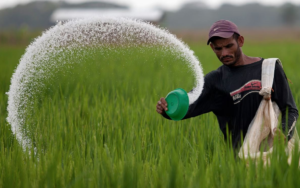In the ongoing battle against global warming, the focus has often been on reducing carbon emissions. However, methane, while less prevalent, is significantly more harmful due to its high efficiency in trapping heat. Addressing methane emissions is crucial for achieving global climate goals. Enter Windfall Bio, a California-based startup pioneering a novel approach to methane reduction that could have a substantial impact on the environment.
Windfall Bio has developed a method utilizing “mems” — methane-eating microbes that naturally occur in soils and wetlands. These microbes consume methane as their primary food source, converting it into fertilizer. This innovative approach not only reduces harmful methane emissions but also produces a valuable byproduct. According to Josh Silverman, CEO of Windfall Bio, the company’s mission is to provide these microbes to various industries that generate methane, such as agriculture, landfills, and oil production.

The application of mems is versatile. For instance, farmers can use these microbes to capture methane emissions from livestock, particularly cows, and convert it into fertilizer for their crops. Similarly, oil producers and landfills can deploy mems to mitigate methane emissions from their operations. Windfall Bio offers an additional incentive by buying back the fertilizer produced, providing a revenue stream for these industries while contributing to environmental sustainability.
Traditional fertilizer production is energy-intensive and generates significant carbon emissions, especially in the production of ammonia-based fertilizers. Windfall Bio’s microbial method presents a cleaner, more sustainable alternative that aligns with the growing demand for environmentally friendly solutions.
Since launching their product to clients two years ago, Windfall Bio has seen a surge in demand that has far exceeded expectations. The company now serves customers across multiple continents and continues to attract interest from various industries. Despite being an early-stage company, investors like Brett Morris, managing director at Cavallo Ventures, are confident in Windfall Bio’s potential to scale and meet the growing global demand for methane mitigation.
One of Windfall Bio’s most promising ventures is a pilot program with Whole Foods Market dairy suppliers. This partnership aims to reduce methane emissions in dairy farming and enable Whole Foods to market its products as climate-friendly, appealing to environmentally conscious consumers.
Backed by notable investors including Cavallo Ventures, Prelude Ventures, Amazon Climate Pledge Fund, Breakthrough Energy Ventures, and Mayfield, Windfall Bio has raised $37 million in funding to date. With this support, the company is well-positioned to expand its operations and continue making significant strides in methane reduction and sustainable agriculture.


















